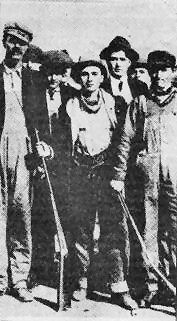Most Recent Additions
Pat Halley
Revenge of the Clowns
Origins of April Fools’ Day
It’s not easy being a fool. All the fools on television and in Hollywood make competition stiff but it has been worse. From the sixth to the tenth century, for nearly four hundred years, the Catholic church and the European nobility declared total war on theatrical activities, and wherever these feudal forces attained power it was at the expense of fools, pagans and local shamans.
Nov 22, 2014 Read the whole text...
Bob Nirkind
The Ludlow Massacre
A Bicentennial moment With American Miners

This article is the third in a series of counter-bicentennial pieces dealing with the more sordid and less-acknowledged incidents in America’s 200-year-old history.
The era from 1865 to 1919 signaled an important, pivotal development in America’s economy. It was a period in which the dominance of individual, agrarian-based capitalism, often characterized as “rugged individualism,” was overthrown by the organized forces of corporate monopoly capitalism, bringing about irrevocable economic and social transformations in the lives of millions of people.
Nov 22, 2014 Read the whole text...
Fifth Estate Collective
Detroit Seen
As promised in our March issue, the FE will be throwing another rip-roaring benefit, to raise money for the paper’s maintenance and provide a great time for all. To be held on Saturday, April 10 (9 until ?) at Formerly Alvin’s Delicatessen (on Cass between Antoinette and Palmer near the WSU campus), the $2.50 admission charge will include dancing to a great blues band headed by Detroit’s own BoBo Jenkins and lots of free beer. As before, all money goes toward the continued appearance of this paper and we are looking forward to your support and participation.
Nov 20, 2014 Read the whole text...
anon.
Easter Canceled
Christ’s Body Found

(The Sunday News supplement)
Caption: The feet that once walked the Sea of Galilee here protrude from the mud, still showing the nail scars from the crucifixion.
JERUSALEM--UPI-- The Christian Faith lies in ruins today as the central myth of the world-wide religion--the Resurrection of Christ-- was shattered by the discovery of a 2,000 year-old corpse and its positive identification as that of Jesus of Nazareth.
Nov 20, 2014 Read the whole text...
John Zerzan
Paula Zerzan
Who Killed Ned Ludd?
A History of Machine Breaking at the Dawn of Capitalism

The argument that the advent of capitalism brought a rise in the standard of living for workers has been refuted before, but is shown graphically in these two prints. Prior to the dominance of the capitalist economy and the establishment of the first factories in England, manufacturing was done in small shops and cottages overseen by a working master craftsman employing several apprentices and helpers. At left is a typical 18th Century establishment (1740) using foot and crank powered lathes. Large windows were the only source of light and regulated working time.
Nov 20, 2014 Read the whole text...
Liberation News Service
Attica: Victory at the trials
NEW YORK (LNS)--A little more than three years after the first Attica indictments were handed down at a snow-covered courthouse a few miles from Attica State Prison in upstate New York, the Attica defendants and their supporters have won an almost complete victory.

On February 26 and 27, all but one of the remaining indictments were dismissed by a Buffalo, New York judge. Under the shadow of pre-trial defense revelations of improprieties by state officials, a major indictment charging ten former Attica prisoners with kidnapping guards was dismissed. The next day two indictments charging three inmates with assaulting prison guards was also dismissed.
Nov 19, 2014 Read the whole text...
Fifth Estate Collective
Staff and Contributors
FIFTH ESTATE #271, April, 1976, Vol. 11, No. 7
Millard Berry
Alan Franklin
Ralph Franklin
Dennis Rosenblum
Bob Nirkind
Pat Halley
Colleen Jensen
E. B. Maple
Mr. Venom
Paula Zerzan
Pat O’Bryan
Peter Werbe
Algirdas Ratnikas
Marilyn Werbe
John Zerzan
The Fifth Estate Newspaper, a non-profit Michigan corporation is published monthly at 4403 Second, Detroit, MI 48201; phone: (313) 831–6800. Office hours are: 1:00–5:00 P.M., Mondays thru Fridays. Subscriptions are $3.00 for 12 issues. Call 842–8888 for retail sales outlets. Second Class postage paid at Detroit, Michigan. No copyright. No commercial advertising accepted.
Nov 19, 2014 Read the whole text...
Dora Kaplan
Kills Husband--Acquitted
Victory in rape case
“Shit, I beat my wife once a week--and she LOVES it!”
The above quote, issued from the lips of my supervisor one day at work last week, did not particularly surprise me. It seemed the “typical” American macho male’s rationale to any implication that women/wives may not enjoy playing subservient roles.
Nov 18, 2014 Read the whole text...
Various Authors
Letters
To The Fifth Estate:
We had a dim premonition the shallow-minded comedians would one day use what they thought to be DADA as a way of deadening men’s minds.
“Propagandada Discovered in Detroit” (Fifth Estate, March 1976) confirms this. YOU NORMALS are too weak to be good, too good to be really bad....only weak and in consequence, pathetic.
Nov 18, 2014 Read the whole text...
Peter Werbe
Sex Economy
Toward a Self-governing Character Structure
Coming to grips with the totality of Wilhelm Reich’s anti-authoritarian social psychology is beyond the scope of any short article. [1] Instead, this will be a brief summation of his notion of Sex-economy, which, along with Work-democracy constitute two of his major concepts.
To present Reich in such a manner means by necessity that many apparent inconsistencies in his work must be neglected. [2] To call oneself a Reichian (or a Marxist) means you raise insightful thought to the level of an ideology--a doctrine to be defended in all of its peculiarities.
Nov 18, 2014 Read the whole text...
Fifth Estate Collective
The Absurdity of Politics (cover text)
The voter is a man who comes where he is summoned one day like a flunkey, to one who whistles for him as for a dog trained to obey, who comes on the said day only and not on any other day. He is a man who comes when authority says: “The moment is here to sanction one more time a system established by others and for others than yourself.
Nov 17, 2014 Read the whole text...
Fifth Estate Collective
Contents of print edition
FIFTH ESTATE #392, Fall/Winter, 2014, Vol. 49, No. 2
Cover: D. Sands
4 Welcome to the Idiocene
Max Cafard
5 Logistical Anarchism
Jeff Shantz
7 VR Troopers:
Jason Rodgers
8 Seattle’s Left Bank Books
Sylvie Kashdan
9 Anarchist Golf?
Joseph Winogrond
11 Free Marius Jacob Mason
12 Dirty Yeti: DIY House
Nov 16, 2014 Read the whole text...
Fifth Estate Collective
Margot Adler, Wiccan Priestess, Passes
A Fifth Estate Connection

Margot Adler, if known to Fifth Estate readers at all, is probably known as a longtime correspondent for NPR radio since 1979. She died on July 28 of cancer at the age of 68.
However, those who do know of her may also be aware that she considered herself a Wiccan high priestess who adhered to the tradition for more than 40 years. Also, there is a specific Fifth Estate connection quite distant from Nationalistic Pentagon Radio (more fitting for its acronym than its actual name).
Nov 16, 2014 Read the whole text...
Kristi Phillips
Political Music is Mysterious
I played the guitar once when I was seventeen in front of a crowd of college students. The building had a sign outside that read, Built During World War II. There was a spiked fence that ran a mile around Orange St. and the workers sold cheap beer in the back. I sang a song that was written by yours truly; it was about war and conformity in America.
Nov 16, 2014 Read the whole text...
Fifth Estate Collective
What to know...
What to know when going to a demo, how to end NSA targeting, & a shocking way to stop rapists.
MILITARIZED POLICE AROUND THE WORLD routinely use what they designate as “riot control agents” against their rebellious civilian populations. Because the substances travel with the whims of the wind and are often used in large quantities, a person does not even have to attend a demonstration to become exposed.
Nov 16, 2014 Read the whole text...
Valdinoci
Former ELF/Green Scare Prisoner Now a Fascist
It’s been an open secret for months that Nathan Block (better known as “Exile”), a former Green Scare prisoner who served a number of years in prison for several Earth Liberation Front actions, has become a fascist. This has been known not just through numerous personal accounts from Olympia, Wash., but from copious postings on Block’s tumblr blog, Loyalty Is Mightier Than Fire.
Nov 14, 2014 Read the whole text...
Peter Werbe
No Dance; No Revo
What did Emma Goldman really say?
So famous is the quote (rendered in a variety of ways), “If I can’t dance, I don’t want to be in your revolution,” that it is even emblazoned on a souvenir coffee cup peddled by the Berkeley, Calif.-based Emma Goldman Papers project, and attributed to the turn of the last century anarchist and free love advocate.
Nov 14, 2014 Read the whole text...
Quincy B. Thorn
Tales From the Cybersphere
Fifth Estate on the Web: A guide to the Web presence of Fifth Estate staff, writers, and friends
Longtime Fifth Estate friend and supporter Julie Herrada has contributed many articles and photos to the magazine over the last 15 years. These can be found by searching the growing archives on our site at FifthEstate.org. Use the Search box or the FE Authors drop-down list on our home page to find what we currently have online.
Nov 14, 2014 Read the whole text...
Tom Nys
Anarchist Art in the Gallery
Does it become chic ornamentation, a spectacularization of resistance, or a way to spread the ideas of anarchy?
There is a common notion of the art world, a shared idea of what it is and what it is about. However, that also comes with a popular misconception: the perception of the art world as one, univocal concept when in fact there is a multitude of art worlds. Some intersect and overlap while others function isolated from the others, often informed by a number of opposing principles.
Nov 8, 2014 Read the whole text...
Jason Rodgers
VR Troopers
The Virtuality of Reality

Way back in the 1990s, the bleeding edge of the cyberpunk counterculture was in conflict over what the next stage of technological transformation was to be. On one side were the psychedelic, techno-shamans of virtual reality (VR). On the other, the data pirates of the web. The advocates of virtual reality argued that cheap VR units would soon appear in every home, providing an endless array of sensory stimulation for all participants, a world of unheard of experience.
Nov 8, 2014 Read the whole text...
John Zerzan
A Word on Civilization & Collapse
“Th-th-th-that’s all folks!” Has the human race’s grandest achievement--civilization--assured its collapse? It doesn’t look good!
Civilizations have come and gone over the past 6,000 years or so. Now, there’s just one----various cultures, but a single, global civilization.
Collapse is in the air. We’ve already seen the failure, if not the collapse, of culture in the West. The Holocaust alone, in the most cultured country (philosophy, music, etc.), revealed culture’s impotence.
Nov 5, 2014 Read the whole text...
Bryan Tucker
Death & Deadening
Even in our final moments, the machine and the market reign
Modern modes of handling concerns in the death and dying spheres seem emblematic of disturbing trends found throughout mass culture.
Due to regrettable circumstances, I have had recent exposures to a body kept fresh on a mechanical ventilation machine in an intensive care unit; some aspects of the evaluation of the worth of a life lost in an accident; and services offered to the terminally ill and their families.
Nov 5, 2014 Read the whole text...
Joseph Winogrond
Anarchist Golf?
Does the club house sport have hidden ancient origins?
On the Anarchist Origins of Golf (Expanded version--MS Word, 110 KB)
Although golf’s popularity has waned in recent years, losing millions of players, its abuse of land, water-use and chemicals continues on a mass world-wide scale according to the World Anti-Golf Movement.
The multi-billion dollar industry has introduced an insignificant number of organic courses to address the criticism of golf’s horrid impact on the environment, and one can note a degree of panic when larger pizza-sized holes on the greens are being considered to increase its appeal.
Nov 3, 2014 Read the whole text...
Taylor Weech
Dirty Yeti
Spokane’s DIY House

Neither the fire marshal nor the police have ever paid a visit to the Dirty Yeti. It’s a small house in Spokane, Wash. which has hosted shows for local bands and a variety of musicians and artists on tour, travelers from around the world, has been a kitchen and pantry for the local Food Not Bombs, and a zine publishing and workshop space alongside its rotating cast of permanent residents.
Nov 3, 2014 Read the whole text...
Ron Sakolsky
Surrealism is (Still) Elsewhere
Like anarchy, surrealism boldly demands the impossible
It seems that the more art school training one receives at the academy, the more one is likely to be confused about surrealism or overtly hostile to it. Much of the malaise around surrealism in art circles stems from the insularity of the art world itself.
While surrealist ideas and practices can be expressed artistically, surrealism cannot be reduced to a style or school of art, even one aimed at inspiring radical political action. Nevertheless, surrealism is typically portrayed by academics as merely one historical moment in the grand cavalcade of failed avant-garde art movements of the 20th century.
Oct 20, 2014 Read the whole text...
Norma D. Kotomy
The Failure of Non-violence
Book review
a review of
The Failure of Non-violence: from the Arab Spring to Occupy by Peter Gelderloos, Left Bank Books, Seattle, 2013, 306pp. leftbankbooks.bigcartel.com
Peter Gelderloos’s The Failure of Nonviolence is a thought-provoking invitation to authentic debate.
This kind of discussion is especially relevant for those of us who welcome the recent worldwide social insurgencies, and are not committed to pacifism as an ideology. The book focuses on tactics and strategies used by social movements, and encourages critical debate about defining success and evaluating which struggles have been successful and which ones have not.
Oct 20, 2014 Read the whole text...
David Solnit
25 Years of Giant Puppets, Mass Action & Public Spectacle

“Puppet theater...[is] an anarchic art, subversive and untamable by nature, an art which is easier researched in police records than in theater chronicles.”
--Peter Schuman, founder of Bread and Puppet, the great grandparents of political giant puppetry in North America
Oct 18, 2014 Read the whole text...
Josefine W.W. Parker (Voyager)
Tune, Occasion, and Memory of Mnísota
Identity & Remembrances of the 2008 RNC Protests

I don’t dwell often on the 2008 Republican National Convention (RNC) protests, yet an acquaintance jarred my memory. En route to summer solstice ritual, she tells me she moved from Minneapolis.
“My only impression of Minneapolis was the RNC,” I sigh.
“I was on the welcoming committee,” she recalls with a knowing rearview mirror glance.
Oct 18, 2014 Read the whole text...
Max Cafard
Welcome to the Idiocene
It has been proposed that the present era of life on earth should be called the Anthropocene to reflect the human domination of our planet.
However, an elegant, scientific-sounding term like anthropocene seems like a cop-out, a handy euphemism to hide exactly what kind of domination this is and what it’s doing to the planet.
Oct 18, 2014 Read the whole text...
Jim Feast
H. Leivick, Anarchism & Yiddish Theatre
The Golem & other plays electrified New York audiences in the early 20th century
There is a staple of the Yiddish theater written in 1921 entitled, The Golem (sort of a Jewish Frankenstein).
It still remains quite popular in translation including a 2002 Off-Broadway run. I saw it performed in 1984 at a free outdoor staging starring Randy Quaid as the monster.
However, the play has two striking peculiarities. First, no one seems to remember the author’s name. Second, it was written as a “dramatic poem in eight scenes,” and originally thought to be unstageable because of technical demands. Although adapted into its current form, many theatergoers still find parts of the play dreadfully obscure.
Oct 17, 2014 Read the whole text...
Ian Erik Smith
Domesticated Animals & Us
How the early North American colonists used animals to subdue the Native people
a review of
Creatures of Empire: How Domestic Animals Transformed Early America by Virginia Delohn Anderson. Oxford University Press, 2006, 336 pp., $19.95
Civilization is a lie. Its images mask violence and its logic is that of genocide. Even the most banal scene of grazing cattle, while seemingly serene, portrays a weapon of war.
Oct 16, 2014 Read the whole text...
Moira Meltzer-Cohen
Free Marius Jacob Mason
Anarchist Political Prisoner begins Gender Transition

As part of a gender transitioning process, environmental and anarchist prisoner, Marius Jacob Mason, announced recently that he will no longer use the name, Marie, and will utilize male pronouns as self-descriptions for himself. Mason was arrested in 2008 by federal authorities under his previous name after being snitched out by her then ex-husband for two acts of property destruction that occurred in 1999 and 2000. No one was injured in either action. He accepted a plea bargain and was sentenced to almost 22 years in prison, the longest given any Green Scare prisoner.
Oct 16, 2014 Read the whole text...
Jeff Shantz
Logistical Anarchism
Organizing against the Idiocene
Social resistance has reached a certain impasse, a conundrum as nation states impose austerity as an extended regime of governance throughout social life.
In North America, movements still race from crisis (response) to crisis (response), while organizing often occurs around rather narrow issues.
The alternative globalization politics of the last two decades, Occupy and the street protests against the IMF, World Bank, and G20, are posed as having emerged spontaneously as resistance to the state and capital.
Oct 16, 2014 Read the whole text...
Fifth Estate Collective
Contents of print edition
Fifth Estate Issue #377, March, 2008, Vol. 43 No. 1
4 Readers’ letters
6 Green Scare News: Police Terrorize Earth First!er in Ohio
7 Powerlessness & the Power of the Prank from La lettre versatile de Jimmy Gladiator
8 Bowling with the Bonobo Bashers by Pieter Primatus
10 Stronger Wine! Madder Music! A manifesto by Apio Ludd
Oct 15, 2014 Read the whole text...
Fifth Estate Collective
Back cover
Erica A. Smith: On The Political Situation Experienced In Our Era
Contrary to the honeyed words of gentlemen, this Age of Empire is a pestilence upon every continent and soul, through colonization manifest or implied. Rich men from stone buildings wade blindly through the penniless on their way to the opera, at leisure after a day spent plotting wars across the seas; and though these gentlemen are excellent at imposing a world order, they are equally adept at colonizing the women who maintain their homes.
Oct 14, 2014 Read the whole text...
No! G8 Japan
Call for anti-G8 Action

In July, 2008 heads of the states that monopolize two-thirds of Earth’s wealth will gather at Toya Lake in Hokaido, Japan. Although the so-called “Group of Eight” (G8) does not have any legitimate right for deciding planetary affairs, they have self-appointed themselves world ruler. Thus the G8 has driven neo-liberal globalization at the same time as spreading poverty, violence, hatred, segregation, and environmental destruction.
Oct 14, 2014 Read the whole text...
Laura Corsiglia
CB Surf Scoter
the cosco busan
a shipping ship
hit the bridge in the san francisco bay some weeks ago
and — perhaps you’ve heard
hundreds of birds--were oiled
poisoned corroded
bunker fuel’d
well
Monte ran the wash room
and i became a rinser
(convergent volunteers:
flock weep work keep
awake)
hot jet under into each feather
of each bird
dawn cuts grease
later then earlier each day
close up right here
waking dream life
remedies
lack of sleep
steam
bites
feather condition
waterproofing
feet
eyes
lines
death
leakage
slip
Oct 14, 2014 Read the whole text...
David Watson
For Pat ‘the Rat’ Halley
“The layman Ho asked Basho: ‘What is it that transcends everything in the universe?’ (another version: ‘If all things return to the one, to what does the one return?’)
“Basho answered: ‘I will tell you after you have drunk up all the waters of the West River in one gulp.’
“Ho said: ‘I have already drunk up all the waters of the West River in one gulp.’
Oct 14, 2014 Read the whole text...
David Watson
Remembering Jim Campbell
Our longtime friend and comrade Jim Campbell died suddenly last September 17 of heart failure. He was 57 years old. Jim was a mainstay of the Toronto (and larger Canadian and international) anarchist community. Though we had not been in close touch lately, we had a long political and personal relationship going back to the late 1970s, including political collaboration, correspondence, and visits in Detroit and Toronto.
Oct 14, 2014 Read the whole text...
Vermillion Sands
The Tragic Death of Suharto
We here at Fifth Estate feel that a few words of remembrance are necessary to mark the passing of “Smiling General” Suharto. Beginning in 1967, this brutal terrorist’s “New Order” military regime was as vicious as the similarly well-funded US client-state dictatorships of Saddam Hussein, Augusto Pinochet, and the Shah of Iran. His government was a particularly spectacular showcase of nepotism and cronyism that rivaled that of Ferdinand Marcos thanks to hundreds of millions of Cold War dollars in US aid and crazily lucrative exclusive corporate concessions (with Chase Manhattan Bank, US Steel, British American Tobacco, General Motors, ICI, and a number of US petroleum combines) that allowed his closest friends and family to build monopolies and amass fortunes. Almost all of Indonesia’s current environmental disasters can be linked directly to the Suharto ruling clique’s industrialized pillaging of the archipelago. When he was finally forced from power in 1998 after the Pacific Rim economic crisis, Suharto had hoarded away more than $10 billion in personal wealth in foreign bank accounts, an inconceivable amount of money equivalent to more than 10% of Indonesia’s total foreign debt.
Oct 14, 2014 Read the whole text...
S. Laplage
Albert Cossery
Subversion by irreverence and ridicule
Anarchist Albert Cossery’s books are the most irreverent that I’ve ever read, ridiculing those in power, the police, the wealthy, and the stupidities of our industrial society. Everything our puritanical society deems important--material wealth, ambition, proper conduct, hard work, university degrees, progress--is ridiculed in his novels, most of which are set in Arab countries (especially Egypt). He mocks bourgeois materialism, consumerism, and productivity while reserving his sympathies for the lowlife: street-corner layabouts, hashish dealers, petty thieves, beggars, confidence tricksters (“shuttar” in Arabic), and bandits.
Oct 13, 2014 Read the whole text...
Don LaCoss
Without a Glimmer of Remorse
Book review
a review of
Without a Glimmer of Remorse by Pino Cacucci, translated by Paul Sharkey, illustrations by Flavio Costantini (2006, Christie Books/Read and Noir; 364 pp.)
Read and Noir is the anarchist crime fiction imprint of anarchist Stuart Christie’s publishing collective; it’s an intriguing idea that deserves to be supported and I look forward to future titles. Back in 2005, Read and Noir put out an English-language translation (also by Paul Sharkey) of Pedro de Paz’s murder mystery/political thriller The Man Who Killed Durruti. This time around, it’s Pino Cacucci’s 1994 fictionalized biography of anarcho-bandit Jules Bonnot (1876–1912), the pre-First World War burglar, counterfeiter, car thief, cop-killer, and bank robber who was the most wanted man in France at the time of his death. (Interested readers may enjoy Bernard Thomas’s La Bande a Bonnot [1967] and Richard Parry’s The Bonnot Gang [1987], two of the best non-fiction histories of that affinity group.)
Oct 13, 2014 Read the whole text...
Oliver Katz
Jacques Vaché and the Roots of Surrealism
Book review
a review of
Jacques Vaché and the Roots of Surrealism, including Vaché’s War Letters & Other Writings, by Franklin Rosemont, illustrations by Jacques Vaché, 2008, Charles H. Kerr Publishing, 388 pp.
In early January 1919, a twenty-four year-old army translator named Jacques Vaché was found dead in a hotel room after a long weekend of partying. Not much is known about him--he was born in France to a French father and British mother, spent some time as a child in French Indochina, was drafted into the army as a translator when the First World War began in 1914, suffered a shrapnel wound in 1916, and that he smoked a fatal dose of opium about six weeks after the war was over. All that remains of his works are a couple of book reviews from a pre-war ‘zine he published with friends, about a hundred letters to friends and family from the battlefield, some experimental writings, and assorted drawings and doodles. Yet somehow Vaché, “a master of the art of attaching very little importance to everything,” has emerged to become a critical missing link between the most revolutionary cultural currents of late Symbolism, dada, and surrealism in early twentieth-century Europe.
Oct 11, 2014 Read the whole text...
Ron Sakolsky
Rocks in my Pillow
Book review
a review of
Anarchy and Art: From the Paris Commune to the Fall of the Berlin Wall, by Allan Antliff, Arsenal Pulp Press, 2007
“Do you believe,” she went on, “that the past dies?”
“Yes,” said Margaret. “Yes, if the present cuts its throat.”
--Leonora Carrington
When I first heard about this project, I was excited at the prospect of a book entirely devoted to the history of anarchy and art. Sadly though, the result is a disappointment. Politically-speaking, the book rides the fence between the anarchist milieu and the authoritative voice of academia when what is needed is a sturdy pair of wire cutters, perhaps a catapult, or maybe even a battering ram. For me, the most positive aspect of the book is that its essays stimulated my critical thinking in response to its arguments. To be fair, attempting to write a history of the confluence of anarchy and art from the Paris Commune (1871) to the fall of the Berlin Wall (1989) is such a monumental project that much of the story will inevitably fall into the cracks of the eight episodic chapters that comprise its less than 200 pages. When I initially skimmed the book, I expected to be writing a basically positive review with my main critique being about the way in which surrealism is handled. However, upon actually reading it with some care, I soon realized that the book is problematic from start to finish.
Oct 11, 2014 Read the whole text...
Fifth Estate Collective
Acid Reigns
Note: Originally, FE special correspondent Kellie Button valiantly embedded herself with a group of anarchist LSD enthusiasts (represented here by the initials “HO”, “KG.”, and “AJ”) in order to report on recreational drug use for this issue’s special “Escape” feature. Unfortunately, a very long weekend in southeastern Minnesota among these self-described “anarcho-acidheads” yielded very little usable material, but something that did come up that has a bearing on the anti-authoritarian, anti-capitalist anti-RNC and anti-DNC actions currently under preparation. The relevant portion of one morning’s recorded discussion is excerpted here. Clarifying information provided by the editors appears in brackets.
Oct 9, 2014 Read the whole text...
Bureau of Public Secrets
Anti-Prison
Nothing exemplifies the sickness and degradation of the present society more than its “criminal justice” system, a cold-blooded infliction of suffering on a scale that far surpasses whatever offenses its victims may have been guilty of.
Think how long an hour can seem if you’re caught in some boring or frustrating situation. Then imagine being locked away not for an hour, or a day, or a week, but for years in a mean, ugly, hopeless environment administered by guards and officials who are in many cases more vicious and mentally sick than most of your fellow prisoners, who themselves may not be the most charming or uplifting of companions. And to add to the torment, knowing that a considerable portion of the people on the outside have been led to believe that you are being “coddled,” and that “light” sentences of “only” a few years amount to “getting off easy”
Oct 9, 2014 Read the whole text...
Walker Lane (Peter Werbe)
Escaping from Europe
Why Our (White) Ancestors Came Here in the First Place
“[The Arawaks]...brought us parrots and balls of cotton and spears and many other things, which they exchanged for the glass beads and hawks’ bells. They willingly traded everything they owned ...They were well built, with good bodies and handsome features....They do not bear arms and do not know them...They have no iron. Their spears are made of cane...They would make fine servants.”
--Christopher Columbus, ship’s log, October 12, 1492
Oct 9, 2014 Read the whole text...
K.M. Koan
Casey C.
Rhea Riley
From Seattle to St. Paul
There’s a specter haunting the northern Midwest. It is the specter of Seattle.
These days, no gathering of radicals in these parts can happen without some talk about our plans for the Republican National Convention in St. Paul in late summer. And no talk about anti-RNC action can happen without someone mentioning N30, the November 1999 protests against the WTO in Seattle.
Oct 9, 2014 Read the whole text...
anon.
Genderfuck the RNC!
For the liberation of desire! For dance parties amidst the ruins!
On November 9 to 11, Milwaukee hosted the Midwest Anti-RNC Planning consulta. During the Sunday break-out strategizing session, a group met to discuss the possibilities of militant trans and queer action against the Republican National Convention in 2008.
Those involved in the discussion expressed their desire for a trans and queer bloc to play an integral and aggressive role in the strategy to shut down the RNC. It was proposed that such a bloc could hold one of the key intersections surrounding the convention center or could crash the parties of especially grievous religious fundamentalists.
Oct 9, 2014 Read the whole text...
Smidge
Hauling Secrets
What follows is an edited entry from “Hauling Secrets” an anonymous job-blog written by a handful of waste haulers in the Upper Mid-west. (haulingsecrets.com). The site offers interesting entries on bizarre on-the-job findings, as well as reflections on the cosmology of the waste stream in our over-developed civilization.
Oct 9, 2014 Read the whole text...
